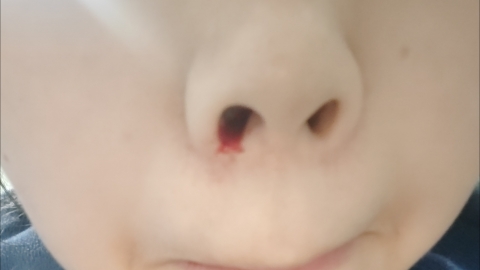What medication should be taken for a nosebleed?
Generally, the main causes of nosebleeds include dry environment, external impact, rhinitis, sinusitis, and deviated nasal septum. Patients should choose physical treatments or follow medical advice to use medications such as budesonide nasal spray and cefaclor capsules according to their specific situations. Detailed analysis is as follows:
1. Dry Environment
Remaining in a dry environment for a prolonged period causes rapid moisture loss from the nasal mucosa, leaving it dry and fragile, thus prone to bleeding. It is recommended to use a humidifier indoors to maintain air humidity at 40%-60%. Drinking more warm water and avoiding frequent nose picking can also help reduce mucosal damage.
2. External Impact
Physical impacts or pressure on the nose may cause rupture of blood vessels inside the nasal cavity, leading to nosebleeds. Immediately after an impact, apply pressure to both sides of the nostrils with your fingers for 5-10 minutes to stop the bleeding. After the bleeding stops, avoid forceful nose-blowing. If swelling occurs, cold compresses within 24 hours can help alleviate the condition.

3. Rhinitis
Allergic rhinitis and chronic rhinitis can cause the nasal mucosa to remain congested and swollen for long periods, making it fragile and prone to bleeding when slightly stimulated. Under a doctor's guidance, medications such as budesonide nasal spray, mometasone furoate nasal spray, and loratadine tablets can be used to reduce mucosal inflammation and congestion, thereby decreasing the likelihood of bleeding.
4. Sinusitis
When the sinuses become inflamed, inflammatory secretions continuously irritate the nasal mucosa, causing damage and bleeding. Symptoms may also include nasal congestion and purulent nasal discharge. Under a doctor's guidance, medications such as cefaclor capsules, metronidazole tablets, and赛洛唑啉 hydrochloride nasal spray can be used to control inflammation, alleviate mucosal irritation, and reduce bleeding.
5. Deviated Nasal Septum
When the nasal septum is deviated to one side or has localized protrusions, the mucosa in the deviated area becomes thin and is easily damaged and bleeds due to airflow and dust irritation, with a higher probability of recurrent bleeding. Mild symptoms can be relieved by keeping the nasal cavity moist and avoiding irritants. For severe symptoms, a submucosal septoplasty may be required to correct the nasal septum's shape and reduce bleeding.
In daily life, it is important to keep the nasal cavity clean and avoid picking the nose with sharp objects. When going outdoors in harsh environments, wearing a mask can protect the nasal cavity. Eating a light diet rich in fruits and vegetables with high vitamin content, and regularly checking nasal conditions to detect and address issues promptly are also recommended.






